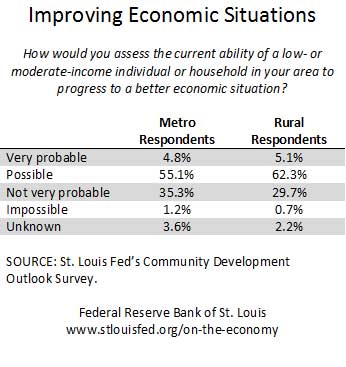The Issues Affecting Low- and Moderate-Income People Differ between Metro and Rural Areas

While some overlap exists, the issues facing low- and moderate-income (LMI) individuals and households differ between metropolitan and rural areas, according to the St. Louis Fed’s latest Community Development Outlook Survey.
The survey gathered responses from community stakeholders across the states comprising the Eighth Federal Reserve District.1 This included a mix of respondents from metro (53.6 percent of respondents) and rural (46.4 percent) areas. (A previous post examined responses among all respondents.)
Affecting Households and Communities
In aggregate, metro area respondents listed generational poverty as the issue having the greatest negative impact on LMI households and communities. Rural respondents, however, listed job availability as the top issue, with generational poverty second. Job availability was third for metro respondents, behind education.
Metro respondents listed education as the basic need most difficult for LMI households to adequately access, with 38.8 percent naming it. Other difficult-to-access needs included shelter (20.6 percent), transportation (18.8 percent) and health care (14.1 percent).
Rural respondents also listed education as the basic need most difficult to adequately access, at 30.4 percent. The order of other needs varied, however, with transportation at 23.9 percent, health care at 23.2 percent and shelter at 9.4 percent.
Assets and Progress
Respondents were asked what the greatest assets of their communities were. Among the replies for metro respondents were:
- “Several large organizations and partnerships to fill gaps of funding most of the time.”
- “The number of available service providers focused on assisting LMI persons and families.”
- “Proximity to jobs and goods/services.”
Among rural respondents, replies included:
- “Higher social capital among residents.”
- “Rural character, open land, quiet streets, friendly people.”
- “Lower-cost housing. A caring community that is generous with food banks, clothing closets, etc.”
Participants were also asked about the current ability of LMI individuals or households to improve their economic situations. The responses are below.

Notes and References
1 Eighth District states are Arkansas, Illinois, Indiana, Kentucky, Mississippi, Missouri and Tennessee.
Additional Resources
Citation
ldquoThe Issues Affecting Low- and Moderate-Income People Differ between Metro and Rural Areas,rdquo St. Louis Fed On the Economy, Jan. 21, 2016.
This blog offers commentary, analysis and data from our economists and experts. Views expressed are not necessarily those of the St. Louis Fed or Federal Reserve System.
Email Us
All other blog-related questions

